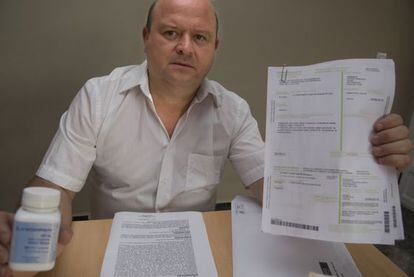"I was the victim of the region's debt"
A cancer patient in Alicante was unable to get the drugs he needed


Javier Ferrándiz experienced the "most distressing" day of his life in June of this year. After successful six-hour surgery that removed a tumor near his kidneys at the public hospital Vírgen de los Lirios in Alcoy (Alicante), Ferrándiz's real troubles began.
The reason? The difficulty he had obtaining the medication his doctor prescribed. Not one of the four pharmacies in Cocentaina, where he lives, would sell him Lysodren, an anti-carcinogenic drug that prevents tumor growth; the product costs 682 euros but is subsidized by Social Security.
"Pharmacists told me they didn't have it, and that it would be hard to find," says Ferrándiz, 42, who is a father of two.
Several days went by. No sign of the Lysodren anywhere. The patient got nervous and turned to a cancer help group called SOLC, and to his local public health center; he also filed a complaint with public health inspectors.
Finally, after jumping bureaucratic hurdles, Ferrándiz obtained the drug at a pharmacy in Alcoy, which got it from a supplier in Murcia on June 22. It reached the patient a week after the date he was supposed to start treatment. The delay did not pose serious health effects, but did cause "unnecessary distress" to the patient, medical sources said.
Pharmacies didn't want to sell the drug as they aren't getting paid by the regions
"The surgeon told me it was too bad about the delay, because the operation went really well," he explains.
Ferrándiz blames the Valencian region's economic woes for what happened to him. "I was the victim of the Generalitat's debts," he says, figuring that the pharmacies did not want to sell him the expensive drug because they themselves are not getting paid the subsidized portion of the price by regional authorities.
Pharmacies in Alicante province have racked up a consolidated debt from February to June of 215 million euros. Besides closing on occasional days in protest, several establishments have now shut down entirely, putting up signs saying: "Closed indefinitely, the administration is not paying us."
An unemployed builder, Ferrándiz is satisfied that his story ended well, but feels he was "treated poorly" by the Generalitat. He says the regional department of health has guaranteed that he will be getting his Lysodren, which from now on he will collect direct from the hospital pharmacy. Each box contains 100 pills, enough for 20 days, and the treatment has to be followed for five years.
The health department said that Ferrándiz's "provisional problem" has been solved, that his is an isolated case, and that there is no risk of Alicante's pharmacies running out of medication.
"In specific cases the medication may be obtained through health centers," said a spokesperson for Health Commissioner Luis Rosado.
But the president of the Pharmaceutical Association of Alicante, Jaime Carbonell, admits that the "situation of asphyxia" has made some pharmacies unable to purchase further material, and warned about a risk of shortages.
"It's already happening, and we have to admit it: some colleagues are being denied loans by the banks and their suppliers will not extend payment deadlines any further," he says.
"I tell some clients to go to another pharmacy because I can't buy their drug and go deeper into debt myself," admits a pharmacist from Valencia, who says she is "in despair" over the regional government's delays; she also says that banks have stopped lending her money.










































